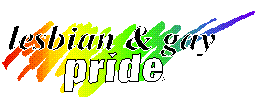 The Council of Lesbian & Gay Pride
The Council of Lesbian & Gay Pride
Paris
Political statement
[french version
![]() ]
[program
]
[program
![]() ]
]
The theme adopted by organizing associations of the events which will celebrate Lesbian & Gay Pride in France, in May and June 1998, is not only a claim ; first, it is an observation which takes the form of a subtraction :
|
|
|
||||||||
50 years ago, at the end of a war where the most fundamental rights of the person were denied, where Jewish, Gypsies, disabled and homosexual people were dedicated to extermination, the General Assembly of UNO proclaimed the Universal Declaration of Human rights. 150 years ago, the French Republic issued the abolition of slavery in its colonies. 400 years ago, Henri IV signed the edict of Nantes. Signed in October 1997, the Treaty of Amsterdam will finally make it possible the European Union to fight against the discriminations based on sexual orientation. It is a tool on the path of this " full citizenship " which the participants in EuroPride claimed in 1997 -- because all do not benefit from basic rights, even if they are guaranteed by the Universal Declaration.
1998 must be the year of the civil recognition of the homosexual couple. Should it be recalled that it was the demand of Lesbian & Gay Pride in 1996, and that from its tribune platform, the spokesman of the socialist party committed himself to support the Contract of Social Union?
Second, the Council of Lesbian & Gay Pride supports the International Lesbian and Gay Association (ILGA), which proclaims in its Manifesto celebrating the 50th anniversary of the Universal Declaration :
|
|
The rights that the homosexuals assert are not different from the human rights. They ask for the full application of these rights, in their letter and their spirit. |
The cause and the effect of their non-application are the homophobia. This fear of homosexuality is expressed by the rejection, hatred, or even violence against people perceived as homosexual. It is comparable with other contrary behaviors with the Universal Declaration and against which it is evenly necessary to protest : sexism, xenophobia, racism, anti-semitism.
The first of the rights is the security of the person ; it is not guaranteed when people are attacked, physically or verbally, or are seen refused the protection of the Law. All must be done, in the law and the society, by the education of the young and the information of the public, so that these homophobic behaviors disappear. The example of the countries where the homosexuals are subjected to social violence, with police brutality, arbitrary imprisonments, torture, with cruel punishments, even with the death penalty, shows that a detailed attention must be given to all the homophobic acts, which are to several degrees the effect of the same hatred.
Among the civil rights, the right to unite and that to form a family are fundamental. The first of these rights from now on is recognized by seven countries which instituted a civil recognition of same sex couples. The second is limited, even in some of these countries, by the maladjustment of the civil law to the new family forms, with regard to parentality. Thus, in France as in the majority of the countries, the homosexuals are refused the right to unite and form a family, whereas the Universal Declaration holds these links as fundamental in the society. This social exclusion consolidates homophobia and feeds it.
Although the freedom of thought, opinion and religion, and their public expression are guaranteed, the society requires that the homosexual preference be confined with the private sphere and not be the subject of a public expression, qualifying it of " proselytism ". This is a constant form of homophobia which constrained a great number of people to dissimulate their emotional life.
The freedom of expression is diverted by those which encourage the hatred of certain categories of people. That the public verbal homophobia is tolerated is contrary with the spirit of the human rights. This spirit justified the legal provisions condemning racism and the incentive to racial hatred, but only some countries condemn the incentive to homophobia.
The right of association, which the homosexual does not enjoy in certain countries, remains limited in France, by the difficulty to make recognize the gay and lesbian associations by the public institutions, whereas many family, religious or ethnic associations profit of a social or institutional recognition. In spite of notable recent progress, gay and lesbians associations are always in hillock with ostracism.
Although the Universal Declaration does not explicitly recognize rights related to the sexual orientation, its spirit and its dynamics impregnated this second half of the century, in particular in the judgements of the European Court of Human Rights.
Work on the human rights is never closed. In 1997, a petition asked for the adoption of an additional protocol European Convention, prescribing the freedom of the sexual preference of the individual and of its expression, the right to the civil recognition of the couple, and the prohibition of discriminations based on the sexual preference. Hold byEuroPride 1998, in Stockholm, this petition will be given to the Council of Europe. Similar additions should be brought to a number of instruments of the French and international law.
The Universal Declaration of the human rights and the spirit which animates it will remain alive in the future demands of gay men and the lesbians.
| Gay and lesbian rights are human rights |